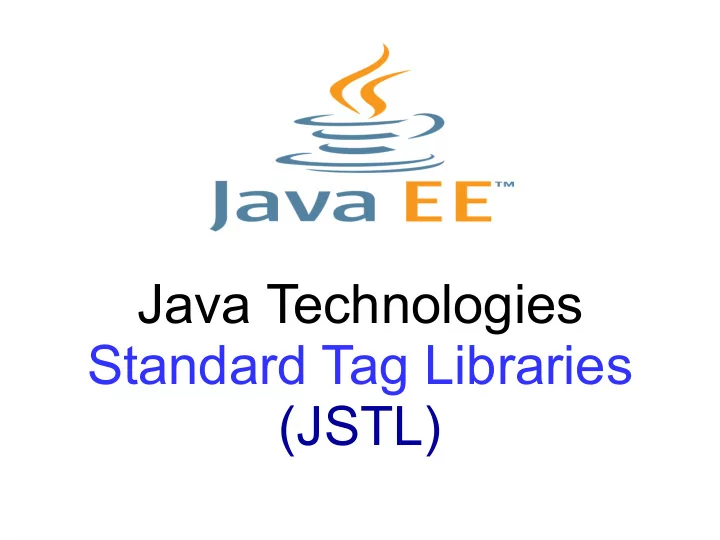

Java Technologies Standard Tag Libraries (JSTL)
The Context ● JSP are used to create the view ● Custom tags are user-defined JSP elements: – encapsulate functionalities – promote reusability and role separation – implemented using ● classes (handlers): by programmers ● JSP → tag files: by designers... ● How can we generate dynamic content in a tag file without writing Java code ?
The Concept We need a solution to: ● Allow the designer to implement custom tags in the form of tag files ● Simplify the creation of JSP pages – accessing the model (data stored in beans) – controlling the execution of a page – etc. ● Standardize the design elements ● Optimize the execution of JSP pages
Example In a JSP (page or tag file), we verify if the user has a specific role, using a scriptlet : <% User user = (User) session.getAttribute("user"); if (user.getRole().equals("member"))) { %> <p>Welcome, member!</p> awful... <% } else { %> <p>Welcome, guest!</p> <% } %> It is difficult to provide a custom tag handler for every situation.
Example (cont.) A solution more appealing would be: <c:choose> <c:when test="${user.role == ’member’}" > <p>Welcome, member!</p> Expression Languge </c:when> Standard Tags <c:otherwise> <p>Welcome, guest!</p> </c:otherwise> </c:choose>
Expression Language (EL) ● Access application data stored in JavaBeans components ● Create expressions arithmetic and logical in a intuitive manner: ${ (10 % 5 == 0) or ( 2 > 1) ? "yes" : 'no' } – ${ header["user-agent"] } – ● No programming skills required ● Language – literals, operators, variables, functions
EL Syntax ● Literals : true, false, null, “a”, 'b', 123, 9.99 ● Variables PageContext.findAttribute( variable ) – page → request → session → application – variable.property or variable[property] – ● Operators : as usual plus: – eq, ne, ge, le, lt, gt, mod, div, and, or, not, empty ● Implicit Objects : – param, request, response, session, servletContext – pageScope, requestScope, sessionScope, applicationScope – header, cookie, initParam, etc.
Examples ${param[’ name ’]} ${!empty param. name } ${header["user-agent"]} ${header["host"]} ${initParam. defaultHelloWorldMessage } ${pageContext.request.method} ${pageContext.session.new} ${pageContext.servletContext.serverInfo} ${pageContext.exception.message} ${ productMap [ category ]} ${ someArray [0]} ${sessionScope. shoppingCart . items }
EL Custom Functions ● Defined in custom tag libraries ● ${prefix:functionName(param1, param2, …)} You have: ${ fn:length (shoppingCart.items)} items – Escape XML tag is: { fn:escapeXml ("<table>")} – <c:if test="${ fn:contains (adresa, "Iasi")}"> – ● In order to create and use a custom function: – define the function handler (a method in a class) – map the implementation to a name in the TLD – use the taglib directive to acces the function
Example of a Custom Function ● The function handler package somepackage; public class MyCustomFunctions { public static String sayHelloTo(String name) { return "Hello " + name; } } ● The TLD <function> <name>hello</name> <function-class>somepackage.MyCustomFunctions</function-class> <function-signature> java.lang.String sayHelloTo( java.lang.String ) </function-signature> </function> ● Using the function <%@ taglib prefix="f" uri="/WEB-INF/tlds/mylibrary"%> This is it: ${f:hello("World")}
Standard Tag Libraries (JSTL) ● A collection of useful JSP tags which encapsulates functionalities common to many JSP applications. ● JSTL has support for: – Core Tags – Formatting tags – XML tags – SQL tags – JSTL Functions
Core Tags (c) <%@ taglib prefix="c" uri="http://java.sun.com/jsp/jstl/core" %> Core tags are the most frequently used JSTL tags. < c:set var="message" scope="page" value="Hello JSTL!"/> < c:out value="${message}" default="Hello World!"/> < c:forEach var="item" items="${sessionScope.cart.items}"> <c:out value="${item}"/> <br/> </c:forEach> < c:import url="someFile.csv" var="content" /> < c:forTokens var="item" items="${content}" delims=","> <c:out value="${item}"/> <br/> </c:forTokens> < c:if test="${empty session.user}"> < c:redirect url="login.jsp"/> </c:if>
Formatting Tags (fmt) <%@ taglib prefix="fmt" uri="http://java.sun.com/jsp/jstl/fmt" %> Used to format and display text, the date, the time, and numbers for internationalized Web sites. <jsp:useBean id="now" class="java.util.Date" /> < fmt:setLocale value="ro-RO" /> < fmt:formatDate value="${now}" type="both" dateStyle="full" timeStyle="full"/> <fmt:setLocale value="ro"/> < fmt:setBundle basename="somepackage.Messages" var="msg" scope="page"/> < fmt:message key="hello" bundle="${msg}"/> I18N L10N
Resource Bundles ● Property Files Messages = basename Messages_ro.properties ro = locale # key-value pairs hello = Salut bye = La revedere welcome = Bine ai venit, {0} ! → /WEB-INF/classes/somepackage ● Classes package somepackage; import java.util.*; public class Messages_ro extends ListResourceBundle { static final Object[][] contents = { {"hello", "Salut"}, {"bye", "La revedere"} }; public Object[][] getContents() { return contents; } }
XML Tags (x) <%@ taglib prefix="x" uri="http://java.sun.com/jsp/jstl/xml" %> Create and manipulate XML documents: parsing XML, transforming XML data, and flow control based on XPath expressions. <c:import url="agenda.xml" var="xml" /> < x:parse doc="${xml}" var="agenda" scope="application" /> < x:set var="friend" select="$agenda/friends/person[@id=$param:personId]" /> < x:out select="$friend/name"/></h2> <x:forEach var="friend" select="$agenda/friends/person" /> < x:out select="$friend/name" /> </x:forEach> <c:import url="agenda.xml" var="xml" /> <c:import url="style.xsl" var="style" /> < x:transform source="${xml}" xslt="${style}"/>
SQL Tags (sql) <%@ taglib prefix="sql" uri="http://java.sun.com/jsp/jstl/sql" %> Tags for interacting with relational databases: connect, read (query), update, delete. < sql:setDataSource var="timtable" url ="jdbc:sybase:Tds:localhost:2638?ServiceName=TimetableDB" driver ="com.sybase.jdbc4.jdbc.SybDataSource" user="DBA" password="sql"/> < sql:setDataSource var="timetabe" dataSource ="jdbc/TimetableDB" /> <c:set var="roomId" value="C401"/> < sql:query var="rooms" dataSource="${timetable}" sql="select * from rooms where code = ?" > < sql:param value="${roomId}" /> </sql:query> <c:out value="${rooms.rowCount}"/> <sql:update dataSource="${timetable}"> update rooms set address=’la subsol’ where code=’C112’ </sql:update>
The javax.servlet.jsp.jstl.sql. Result Interface ● Represents the result of a <sql:query> action that is conform to JavaBeans specifications. ● It provides access to: – The result rows (getRows() and getRowsByIndex()) – The column names (getColumnNames()) – The number of rows in the result (getRowCount()) – An indication whether the rows returned represent the complete result or just a subset that is limited by a maximum row setting (isLimitedByMaxRows()) ● Provides a disconnected view into the result of a query.
Example of using SQL Tags <%@ taglib prefix="c" uri="http://java.sun.com/jsp/jstl/core" %> <%@ taglib prefix="sql" uri="http://java.sun.com/jsp/jstl/sql" %> <sql:setDataSource var="timetable" dataSource="jdbc/TimetableDB" /> <sql:transaction dataSource="${timetable}"> <sql:query var="rooms" sql="select * from rooms"/> <table border="2"> <c:forEach var="colName" begin="0" items=" ${rooms.columnNames} "> <th><b> <c:out value="${colName}" /> </b></th> </c:forEach> <c:forEach var="row" items=" ${rooms.rows} "> <tr> <c:forEach var="column" items="${row}"> <td><c:out value="${column.value}"/></td> </c:forEach> </tr> </c:forEach> </table> </sql:transaction>
Recommend
More recommend